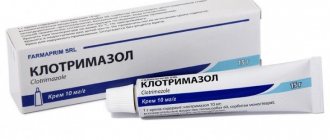The official medical name for the pathological condition in which dryness and burning appears in the vagina is called atrophic vaginitis (colpitis). The disease is characterized by severe irritation, which causes thinning of the vaginal walls, wrinkling of mucous epithelial tissue and a decrease in the secretion of natural lubrication.
Pathological changes are accompanied by characteristic symptoms and can provoke serious diseases. Therefore, a consultation with a gynecologist and examination is necessary. The specialist selects the treatment after receiving the diagnostic results.
Severe itching and itching inside the vagina
Typically, women experience itching and burning in the vaginal area, not only inside, but also on the surface of the skin. Moreover, in some cases it spreads to the labia and anus. All together this causes discomfort, causes anxiety, and disturbs the usual rhythm of life. The person becomes angry, anxious, and loses concentration. Sometimes the problem worsens at night, leading to insomnia.
Of course, the symptom cannot be ignored, but the most important thing is to find out why it appeared.
Advice. If you encounter irritating sensations near or inside the vagina, you need to analyze what could have triggered them. What lifestyle have you led lately, what have you eaten, who have you had intimate relationships with, etc. This information will help you see a possible connection and help your doctor make a diagnosis faster.
It is important for every girl, adult or elderly woman to understand one thing: itching and burning in the intimate area is one of the signs of a huge variety of diseases and disorders, among which there are both quite harmless and life-threatening.
Advice. We will talk about some medications and offer folk remedies. However, if all else fails and you still have severe itching and itching around your vagina, we strongly recommend that you seek specialized help. Games with health lead to sad consequences, which sometimes even modern medicine cannot cope with.
Well, now let's figure out what can cause this unpleasant symptom.
How does vulvar itching occur?
The vulva is the external genitalia of a woman, located between the pubis in front, the perineum in the back and the labia majora on the sides. They are innervated by a large number of nerves: iliac, pudendal, femoral and rectal.
Unmyelinated C-fibers depart from large branches, the duties of which are to convey impulses resulting when certain types of irritants enter the vulvar mucosa. As a result of passing through the spinal cord, such impulses produce an itching sensation.
The largest number of C-terminations are located in the vestibule of the vagina, the clitoris and the labia minora. That is, if irritating discharge accumulates in these areas or, conversely, the mucous membrane dries out too much or swells, and itching will be felt.
Gynecological disorders and diseases
Experts distinguish two large subgroups:
- Inflammatory processes in the female organs: ovaries, uterus, appendages and the vagina itself. Typically, such diseases are caused by bacteria, viruses or fungi. For example, thrush. It occurs when the balance of normal microflora on the vaginal mucosa is disrupted, and harmful fungi flourish. It is accompanied by the release of flakes similar to curdled milk, an unpleasant odor reminiscent of mold, and painful sensations during sexual intercourse. This group also includes various colpitis, vaginitis, vulvitis, endometritis, etc. STDs are also from here. You can encounter such a misfortune during unprotected sexual intercourse. Almost all sexually transmitted infections are quite difficult to treat and are accompanied by a whole range of the most unpleasant symptoms: itching, pain and itching near the entrance to the vagina in women, rash, swelling, wounds, etc. Let's name just a few diseases: chlamydia, genital herpes, condylomas, human papillomavirus (HPV), ureaplasmosis, trichomoniasis, etc. These also include such dangerous ones as AIDS, syphilis, gonorrhea, which are known to have a severe course, and some lead to death.
- Muscle atrophy, as well as possible tumor processes. Another large subgroup of causes that cause itching and itching inside the vagina. As a rule, they are unfamiliar to young women, arise with age and are closely related to hormonal disorders. These are atrophy of the mucous membrane, vaginal kraurosis, urogenital fistulas (formations that occur after surgery on the genital organs). The subgroup also includes various benign and malignant tumor processes.
However, not only gynecological problems can cause irritation. Let's talk about the second group - background diseases and pathological conditions of the body.
Treatment methods
Dryness and burning in a woman’s vagina requires a comprehensive diagnosis, after which the gynecologist prescribes specially selected treatment. In the case of a pathological source, the patient is required to be prescribed medications. If there are no serious medical contraindications, you can use folk remedies.
Medications
Medicines should be taken strictly following the instructions of the gynecologist. Many drugs cause side effects. Failure to comply with the treatment regimen will lead to complications.
| Group of drugs | Name | Application |
| Vaginal suppositories | Cicatridina, Vagikal | Medicines reduce burning and dryness, speed up the healing process of cracks that have formed. Moisturizing the vaginal mucosa is carried out due to hyaluronic acid, which is part of vaginal suppositories. Suppositories are inserted deep into the vagina. A woman is prescribed 1 suppository once a day. It is preferable to use the medicine before bedtime. |
| Homeopathic remedies | Klimadinone, Cyclodinone | Medicines increase the production of estrogen, which is responsible for the normal functioning of the internal glands so that there is enough lubrication inside the vagina. The tablets are swallowed whole, do not chew and washed down with a small amount of water. The adult dosage is 1 tablet 2 times a day. The course of treatment lasts at least 2 weeks, but not more than 3 months. |
| Gel | Ginocomfort, Klimona | Medicines eliminate the symptoms of atrophic vaginitis, restore acidity levels and protect against infection. The restorative gel is injected into the vagina 1-2 times a day using a special applicator. A single dosage is 5 ml. |
Additionally, the woman is prescribed vitamins A and E in capsules to restore and maintain the normal state of the vaginal mucosa. Drug treatment will help level out hormonal levels, improve metabolism and blood circulation in the area of affected tissues. Also restore the intravaginal microflora and destroy pathogenic microorganisms.
Hormone therapy
Dryness and burning in the vagina with the development of a pathological process requires complex therapy. The treatment regimen is selected by the gynecologist. Hormonal medications are prescribed to a woman with atrophic vaginitis if the cause of dryness and burning in the vagina is an imbalanced hormonal balance.
| Medicine | Name | Application |
| Gel | Klimara, Divigel | The drugs quickly eliminate discomfort and accompanying symptoms. The healing gel is applied to the buttocks or lower abdomen. The dosage of the medicine depends on the diagnosis and the woman’s condition. On average, the patient is prescribed 0.5-1.5 g. The course of treatment lasts 12-14 days. |
| Vaginal suppositories | Ovestin, Ovipol | The standard therapeutic dosage is 1 suppository per day. The course of treatment lasts 2 weeks. Then the dosage of the drug is reduced to 1 suppository 2 times a week. |
| Drugs for systemic therapy | Climodien, Divina | A woman needs to take 1 tablet every day for 28 days. It is preferable to take the medicine at the same time. Do not chew the tablets and take them with a small amount of water. |
Patients are also fitted with special hormonal rings in the vagina for 1-3 months. They contain estrogen, releasing it into the mucous membrane, gradually restoring the moisture of the epithelium.
Traditional methods
Non-traditional remedies for vaginal dryness and burning in women can be used, but in combination with other medications and under the supervision of a gynecologist. Natural components are safe for the human body, but we must not forget about the high probability of developing an allergic reaction or individual sensitivity.
The following folk remedies will help eliminate dryness and burning in the vagina in women:
| Name | Recipe | Application |
| Healing decoction for washing | Mix 1 tbsp. l. chamomile flowers with hot water (1 tbsp.). Leave for 15 minutes and strain. | It is recommended to wash yourself with the prepared decoction 3-4 times a day without using soap. |
| Soda | Dilute 1 tsp. baking soda with warm water (500 ml) and stir well until completely dissolved. | The solution is used for douching. Water procedures are recommended to be carried out 2 times a day for 5 days. |
| Baths | Fill the bathtub with hot water. Wrap dried calendula and chamomile flowers in gauze. Place the resulting package in water and leave for 10 minutes. | Water procedures should be carried out for 20 minutes. |
| Herbal collection | Mix boron uterus and motherwort in equal proportions. Pour 2 tbsp. l. herbal mixture with hot water (400 ml). Leave and strain. | The prepared decoction is recommended to be consumed internally. A woman needs to take 1/3 tbsp. 3 times a day. |
| Therapeutic tampons | Dilute vitamin E oil with vegetable oil in a ratio of 1:3. | Moisten a tampon in the resulting solution and insert it into the vagina for 5-7 minutes. |
Aloe juice and sea buckthorn oil will help restore damaged tissue of the mucous membrane and speed up the regeneration process. It is enough to soak the tampons in the solutions and leave them in the vagina overnight.
Somatic diseases leading to burning sensation
The walls of the vagina are covered with mucous membrane, which also suffers from any disturbances within the body. It begins to dry out, becomes thinner, and is attacked by harmful bacteria, which normally do not bother you. Answering the question why it itches inside the vagina, we can name the following diseases:
- Diabetes;
- Helminthiases;
- Lack of female sex hormone estradiol;
- Pathological conditions of the thyroid gland, bladder, kidneys or liver;
- Gastrointestinal diseases, in particular hemorrhoids, dysbacteriosis, anal fissures. True, in this case, only slight itching and irritation around the vagina are felt without odor;
- The presence of parasites such as pubic lice and scabies mites. The patient feels external irritation and mistakes it for internal;
- Stress and nervous experiences, depressive states.
If we talk about diseases that cause this symptom, they are limited to the listed two groups. But there are other reasons.
How to distinguish normality from pathology
In order to understand why white, cheesy discharge in women causes anxiety, you need to understand why they appear in the first place. Healthy girls and women should have a slightly acidic environment in the vagina. It is favorable for the proliferation of lactobacilli. These microorganisms secrete lactic acid in relatively small quantities during their life processes.
It prevents the proliferation of pathogenic bacteria. This acid forms the basis of the secretions themselves. During menopause, their volume decreases, and in adolescence it becomes larger. And at 25–30 years, the cycle stabilizes, and the amount of discharge remains approximately the same.
Usually they are practically invisible, without itching, odorless and, as a rule, colorless, but sometimes the discharge can take on a white, creamy, pale yellow hue. Treatment in this case is not necessary. If additional symptoms do not appear, then this is a temporary phenomenon and a variant of the norm.
At the same time, their consistency is usually liquid, even watery. If the discharge is thick, this is a reason to consult a doctor. Except for those cases when they become more viscous and viscous in the middle of the cycle. This is due to the fact that during this period a mature egg is released from the ovary, which is accompanied by an increase in the amount of discharge, since cells discharged from the cervix are added.
Their volume can increase before the onset of menstruation, and with strong arousal, that is, during sexual intercourse or immediately after it.
If a greenish discharge appears, the shade remains the same, but the consistency has changed, if a sour smell is felt - all these are signs of pathology. Alarming symptoms also include pain in the abdomen or genitals, the presence of lumps in the discharge, itching, burning and other unpleasant sensations in the vagina.
Itching in the vagina: causes not related to diseases
Causes of itching in the vagina can be, for example, allergic reactions to any irritant that has entered the body or found itself in the external environment. Many women have individual intolerance to certain foods, but it’s not always just them. Allergies and irritation can be caused by synthetic underwear, incorrectly selected intimate care products, or regular soap that a girl uses to wash herself. Often many people think that they are itching inside, but in fact the problem is concentrated only on the outside.
Another point is special female conditions: a certain period of the menstrual cycle, pregnancy, breastfeeding, entering menopause and menopause. It is important to understand one more thing: often unpleasant sensations are caused by incorrectly selected hormonal pills or contraceptive suppositories.
Advice. If you decide to use female contraceptives, in particular pills, injections or suppositories, consult a gynecologist and endocrinologist. Such drugs contain hormones, and it is better to choose them wisely than to experience health problems later.
This group of factors also includes: improper diets that depress the general condition of the body, an unhealthy lifestyle and bad habits (alcohol, as is known, dries out the mucous membranes), non-compliance with or ignorance of the basic rules of intimate hygiene. We have described a whole range of reasons that influence the appearance of the symptom. How to fight the disease and how to treat it? Again, only a specialist will give a definite answer, but we will consider the question in general.
Non-pathological causes of swelling and itching of the labia
Lifestyle, habits, and preference for certain foods can cause itching and swelling in the intimate area. These causes are not dangerous if they are identified in time and eliminated.
Irritation after shaving and hair removal
Itching can be caused by improperly performed depilation. Before removing hair, you need to steam the skin well, apply gel, and shave the hair in the direction of growth. Then you can remove the remaining “stumps”, moving in the opposite direction. After the procedure, you should apply a soothing lotion.
As for laser and ELOS hair removal, the beam not only destroys hair, but also damages healthy epidermal cells. During tissue regeneration, itching and slight swelling in the intimate area in women is normal. Lidocaine ointment applied before the procedure can also provoke the appearance of such symptoms. In most cases, redness disappears within a day.
Injuries after sexual intercourse
Improper use of adult toys, rough actions, and increased dryness of the mucous membranes can cause microcracks. During healing, the damaged area becomes swollen and itchy. Also, violation of the integrity of the skin is associated with the risk of infection.
Failure to comply with the rules for using pads and tampons
The additional convenience provided by such hygiene products can cause discomfort in the genital area. Rarely changing pads and tampons leads to the growth of bacteria and the inflammatory process.
Synthetic underwear
Beautiful lace trim, bright colors and ruffles can cause irritation. If your labia are swollen and itchy after changing your underwear, this is most likely the cause.
Overheat
Too hot water while taking a bath, sunbathing without a swimsuit, sweating in the summer or in the cold season with the wrong wardrobe irritate the skin. Itching, burning, slight swelling in the intimate area in women in this case quickly disappear if proper care is provided.
Hypothermia
Clothes that are not appropriate for the season and weather do not fulfill their functions and do not protect the genitals from the cold. Frost and piercing wind irritate the skin, followed by discomfort for several days. With mild hypothermia, short-term “colic” is noticeable; in the worst case, everything in the perineum will be red, swollen and itchy.
Itching in the vagina: treatment
Treatment of vaginal itching almost always involves an integrated approach. The doctor will start by identifying the causes of the problem, tell you what tests you will need to take and what is needed for an accurate diagnosis, determine what is happening to you, and only then prescribe the necessary medications. However, everyone understands that people often turn to a doctor when they have already exhausted ways to cure themselves. This is a wrong approach that threatens your health. We strongly discourage unauthorized prescribing of medications and taking courses of pills. The safest thing you can do to help yourself and alleviate the condition is folk remedies. Take and use all other medications only after prescription by a specialist.
How to treat vaginal itching, and what to do if it itches a lot? Douching with chamomile decoction, carried out daily, will help. Instead of this herb, you can take a mixture of calendula and stinging nettle. You can wash the vagina with a soda solution, and at night insert tampons moistened with melted cocoa and fir oils, cooled to human body temperature. Baths with copper sulfate will be useful. People advise lubricating the affected areas with sea buckthorn oil, and at night using a tampon soaked in this substance.
The safest medications are: Ginocomfort gels, Fluconazole and Pimafucin, drugs with antibiotic action such as Acyclovir or Diflucan. Often, the doctor prescribes a medicine that restores the microflora: Ovestin, Acylact, etc. Don’t forget that usually your sexual partner also has to be treated. Now you know everything about the disease: why it can appear and how to get rid of vaginal itching before getting help from a specialist. Well, our portal wishes every woman good health, mutual love and a great mood! Watch the video for a complete picture of the problem:
Preventive actions
Timely contact with a gynecologist and treatment of causes that can cause problems with vaginal dryness is the best prevention and treatment. Itching, burning and irritation may be a sign of a serious illness. Therefore, even such seemingly minor symptoms require contacting a gynecologist.
To prevent psychological causes, it is recommended to learn more about what happens to the body during menopause, and how to relate to these changes. According to sociological surveys, 72% of women who have reached menopause consider themselves as attractive as before. 82% of women do not feel that they have become less feminine. 8 out of 10 respondents noted that stopping menstruation gave them a sense of freedom that was previously unavailable. And 6 out of 10 women believe they feel much better than before menopause. Any changes have not only disadvantages, but also advantages. 45-50 years old is far from old age.
External non-infectious factors
These include:
- various types of allergies;
- irritation;
- skin diseases;
Often women, especially young representatives of the fair sex, choose the wrong intimate hygiene products. Irritation, redness and swelling occur due to poor quality or simply unsuitable underwear. You should also be especially careful when choosing contraceptives. Condoms with various lubricants, lubricants, tablet contraceptives - this is not a complete list of causes of vaginal discomfort.











